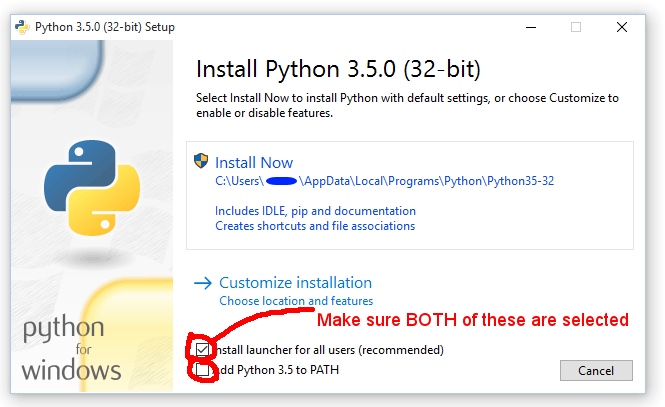Even old New York was once New Amsterdam...
--Sultan Mehmed II of the Ottoman Empire
Overview
Not Constantinople randomly generates city and regional names based on real-life cities. Want a fantasy city name that sounds English but with some French and Italian thrown in? That's what this program does.
Here is "Lyria", a blend of Visigothic, Saxon, and Suebi:
And here is "Pharostine", a blend of Assyrian, Georgian, Alan, Greek, Roman, and Armenian:
About this manual
This manual is intended for non-programmers. If you're a non-programmer, this all might appear a little intimidating. That's OK. I promise it looks tougher to use than it actually is. I'm going to walk you through installing and using the program. Have confidence in your own abilities! It'll be great!
License
See license.txt
The content of provinces.json was scraped from the data files of the video game Crusader Kings II.
Installation
1. Install Python 3
Grab it here (Click the big yellow button).
When installing, be sure to Add Python to PATH (the checkbox at the very bottom).

What is Python?
Python is a programming language. I made this software in Python. Python is a good tool for some things and not a good tool for other things. It's a great tool for doing zany stuff with words.
I could compile it into a .exe or .app, but I don't think it's worth it--for example, I don't own a Mac, so I would have no way to know if it actually works on OS X. If I just leave it as Python code, I can be sure it'll work for you.
2. Open up the terminal
In Windows, go to Start, click on the search dialogue, type in cmd, and press enter.
In OS X, go to finder, type in terminal, and press enter.
Congrats! You're in the Matrix. The terminal looks way scarier than it actually is.
How to read terminal instructions
Whenever you read "type some instructions" that always means: type those instructions in the terminal and then press enter.
Whenever you read something like "type cd <path/to/file>" don't type the < or the >, and replace path/to/file with the actual path to the file (for example: cd c:/users/seth/Not_Constantinople)
3. Install stuff with pip
You just need to have an extra Python thing:
type pip -3.6 install markovify
4. Download my program
Get it here. Unzip the download.
5. Congratulate yourself!
OK you're all set up. Great job!! I knew you could do it.
Usage
Using Windows Explorer (Windows) or Finder (OS X), navigate to Not_Constantinople/Input (I don't know where the folder ``Not_Constantinople` is located; it's wherever you unzipped the download .zip file.)
Input
I've included a couple sample input files in Not_Constantinople/Input They are all .json files. You can open them in Notepad on Windows and TextEdit in OS X. They look like this:
{
"culture": {
"assyrian": 1,
"georgian": 1,
"alan": 1,
"greek": 15,
"roman": 8,
"armenian": 8
},
"name": "pharostine"
}
name is the name of the fantasy culture. culture is the pre-set names of cultures that can blend together. The number is the weight. A higher number means that this culture's place-names will be favored more.
You can use the examples I provided to create your own; just remember to save them to the Input folder, and make sure the extension is .json instead of .txt
See "Cultures" for the list of acceptable cultures.
Output
Once you have set up your fantasy culture(s), open the terminal.
- type
cd <path/to/Not_Constantinople - type
py -3.6 not_constantinople.py
Wait a bit for the terminal prompt to re-appear... that's how you'll know it's done processing.
Go to the Output folder. There's your placenames!
- Settlements are names of towns or cities
- Provinces are names of regions, kingdoms, etc.
Cultures
These are the accepted names of cultures:
- pommeranian
- manden
- greek
- khazar
- serbian
- persian
- saka
- assamese
- alan
- norse
- polish
- sindhi
- hindustani
- egyptian_arabic
- telugu
- northern_sami
- karluk
- sumpa
- occitan
- bohemian
- hungarian
- komi
- welsh
- assyrian
- khanty
- sinhala
- avar
- gujurati
- breton
- croatian
- old_saxon
- romanian
- georgian
- cuman
- ethiopian
- bulgarian
- baloch
- german
- tocharian
- kannada
- lombard
- maghreb_arabic
- turkish
- nepali
- bengali
- panjabi
- tangut
- irish
- ugricbaltic
- marathi
- basque
- suebi
- pictish
- bolghar
- lithuanian
- visigothic
- kirghiz
- severian
- lettigallish
- nubian
- bedouin_arabic
- oriya
- levantine_arabic
- samoyed
- ilmenian
- mordvin
- tamil
- italian
- afghan
- sogdian
- zhangzhung
- prussian
- pecheneg
- saxon
- han
- old_frankish
- bodpa
- finnish
- volhynian
- frisian
- somali
- kurdish
- armenian
- uyghur
- rajput
Note: Some provinces/settlements have the culture tbd because they were originally categorized incorrectly. If you recognize them, please fork this project and make the change.

